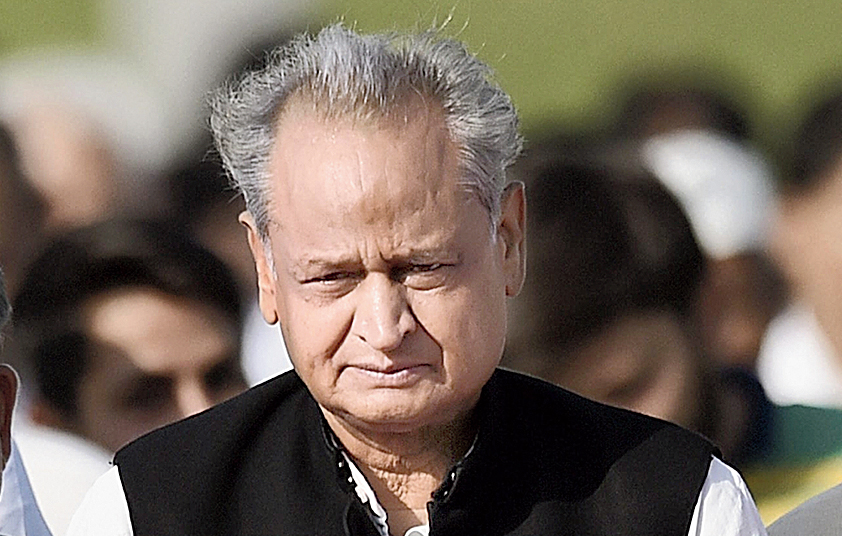The Indian constitution under Articles 25-28 guarantees the freedom to practice religion to each citizen of the country. With this, comes the implied assurance of protection to practice one’s religion. The anti-conversion bills which states are recently introducing are in furtherance to the same fundamental right of the citizens. Few, including Rajasthan Chief minister Ashok Gehlot, hold an aversive viewpoint towards assuring their state subjects their fundamental rights. However, as fate would have it, anti-conversion law could be implemented in Rajasthan soon and there is nothing Gehlot can do about it.
Rajasthan Government under Vasundhara Raje had passed an anti-conversion bill in 2008. The bill, called, ‘Rajasthan Dharma Swatantraya Bill, 2008’, prohibited conversion by “use of force, allurement or fraudulent means”. It defined “conversion” as “renouncing one’s own religion and adopting another” through “fraudulent means” or any other “fraudulent contrivance.” The bill also provided for cancellation of registration of organisations held guilty of abetting conversions.
The bill called for a prison term of up to 3 years and a fine up to Rs 25,000 for general offenders. Those converting minors, women, or persons belonging to Scheduled Castes/Scheduled Tribes would undergo punishment up to five years apart from a fine of up to Rs 50,000.
Having absolutely fair and just provisions, it was quite ignoble of Congress and CPI(M) to protest at the time of the passing of the bill. This indicated that political biases were more important than national welfare to the opposition parties, which holds true to this date. The bill was also specifically opposed by Christian organisations in the state.
The bill since then has been pending with the central government, awaiting the president’s assent.
Gulab Chand Kataria, BJP Leader and Opposition Leader of Legislative Assembly has stated that the leadership will request President Ram Nath Kovind to give his assent to the bill. According to the leader, since anti-conversion bills are being adopted by various state governments, Rajasthan too won’t have an issue in implementing them.
The Yogi Government in Uttar Pradesh has recently approved an ordinance, ‘Prohibition of Unlawful Conversion Bill 2020’, providing imprisonment of 1-10 years and a fine of Rs 15,000 to Rs 50,000 for unlawful religious conversions.
Head of Uttar Pradesh Law Commission, Justice Aditya Mittal (retired) said, “Under this law, religious conversion is allowed, but conversion by force or through any kind of inducement is not.”
Similarly, Madhya Pradesh Home Minister Narottam Mishra said the state government is planning to introduce the Dharma Swatantrya (Religious Freedom) Bill 2020 in the next assembly session. The bill proposes rigorous imprisonment of five years for “luring a person through fraud and forcing marriage by religious conversion.”
The state has an existing law against anti-conversion – Madhya Pradesh Freedom of Religion Act, 1968. But with the rise in crimes, especially against women, the need arises for tighter and unambiguous legislation.
Haryana Home Minister Anil Vij also said, “A strict law will be enacted to control love jihad cases in Haryana. With the enactment of this law, strict action will be taken against any person who is found indulging in religious conversion by pressuring, tempting someone or is involved in any kind of conspiracy of trying to do so in the name of love.”
Looking at the legal perspective, in Stanislaus Vs State of Madhya Pradesh case of 1977, a five-judge bench of the Supreme Court, while upholding the legality of anti-conversion bills in Madhya Pradesh and Odisha, had observed that the anti-conversion laws were “meant to avoid disturbances to the public order by prohibiting conversion from one religion to another in a manner reprehensible to the conscience of the community.”
Even with the rising national outrage due to the gross human rights violation of forced conversions, Rajasthan CM Ashok Gehlot has remained steadfastly against the law. For reasons manufactured, he claims the law is ‘completely unconstitutional’. However, since the Rajasthan anti-conversion bill is pending with the President, the law may soon be enacted, with or without his approval. If the law is passed, Gehlot can repeal it; but with that, he will be boldly underlining his support for forceful religious conversions.
